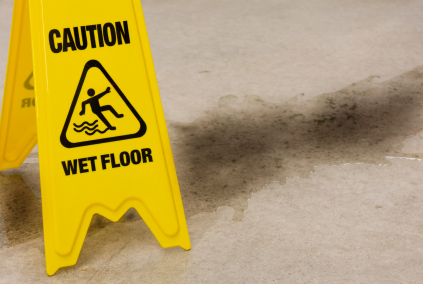
Some of my best leadership principles developed while watching other leadership efforts – or lack thereof. It was an average day experience that shaped one of my “go to” principles to handle little things before they become big things.
The story:
Cheryl and I were in a grocery store. We turned a corner from one aisle into a main aisle and instantly saw a gentleman slip and fall. He wasn’t injured – or at least he said he wasn’t – but it shook him up quite a bit before he scrambled to his feet.
We then noticed he had slipped on something liquid on the floor. Someone standing around said the spill had been there a while. As I expected, within minutes every manager in the store, easily identified by their store shirts and badges, were on the scene – making sure the man was okay and the spill was thoroughly handled.
As I left the store, I saw managers roaming the store, picking up everything they could find on the floor. There was plenty to find. The store was dirty from what appeared to be a very busy day of shopping. Trash was everywhere; including a couple of other spills. With a background in retail and grocery business, I naturally notice things like this when I’m in a store.
It was a good reminder of a leadership principle.
Good leaders learn to handle little things before they become big things.
I’m not suggesting a leader be a micro-manager. To the contrary, I’ve written plenty on this blog to indicate otherwise.
I am suggesting leaders need to always be observant of the things others can’t see or aren’t looking for, which can impact the success of the overall vision.
My story:
I started working in the grocery store when I was 12 years old. The store’s owner seemed to always know what was going on in the store, often pointing out things needing to be fine I or other employees hadn’t noticed and, in our opinion, didn’t matter.
It was sometimes aggravating to this teenager. Years later, when I worked in retail management, reflecting back it began to make sense why my boss had responded as he did.
I began to copy his intentionality. I refused to do any paperwork on Saturdays, for example. The busiest shopping day was reserved solely for customers. I made sure I was roaming the store constantly, looking for anything which might be a problem or an opportunity. Usually, I was the first to recognize a customer looking for an open register or if the store’s temperature was too hot or too cold.
Even today:
As a pastor, I once had an intern who shadowed me for the summer. His initial observation was I paid attention to details. I remember explaining to him part of my job was to look for things others didn’t see.
Certainly, I can’t catch everything, but as the leader I need to be looking for anything which could make or break a successful day in the experience of a visitor. This could be the spill on the floor, a long line at children’s check-in, the missing volunteer or the visitor who looks like they are struggling to find their way in our building.
A few years ago my younger son was preaching for me one Sunday. We arrived at the church and I instantly spotted a trash can overflowing with garbage. I quickly began to address the issue. My son said, “Dad, I thought you weren’t a detail person. How did you notice the trash can was full?”
I assured him I am not a detail person – unless the detail has an impact on the people who may walk on our campus each Sunday. That is a detail which matters. I want to take care of little things before they become big things.
I have learned it well. It could be with spills on the floor – or with people on the team. Big things often start small – so handle the little things which matter.
Practical application:
One way I do this is to be observant, look for details, and simply ask myself a question, such as: If this continues – and gets bigger – how much of a problem is it going to be? Things are almost always easier to deal with when they are smaller than when we let them become “big things”.
By the way, this principle applies in other areas of your life also – such as in your marriage – your parenting – or your personal disciplines.
Leader, what seemingly little things do you need to handle before they become the big things?
Nate and I have launched a new season of the Ron Edmondson Leadership Podcast, so subscribe now. You don’t miss the next one.

